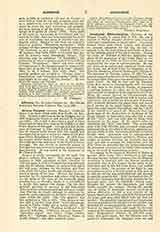

Alvarus Pelagius (ALVARO PELAYO), celebrated writer, b. in Spain about 1280; d. at Seville, January 25, 1352. Alvarus studied canon law at Bologna, but in 1304 resigned his benefices, and entered the Franciscan Order. He is said to have been a pupil of Duns Scotus and to have been tutor to the children of Don Pedro, Regent of Portugal. Certain it is that he became penitentiary to Pope John XXII at Avignon that he enjoyed much favor with this pontiff, and was employed by him to refute the claims of the antipope Pietro Rainalducci of Corbario. In 1233 Alvarus became titular Bishop of Coron in Achaia, and two years later was appointed to the See of Sylves in Portugal. He also served as Apostolic nuncio in Portugal, but was not created cardinal, as some writers have asserted. He was buried in the Monastery of St. Clare at Seville.
Alvarus is chiefly remarkable for his work “De planctu ecclesiae libri duo”. This work, begun at Avignon in 1330, completed in 1332, corrected in 1335 and again in 1340 at Compostella, is notable not only for its extreme defense of ecclesiastical rights but still more, perhaps, for the freedom and force with which the author assails and rebukes the ecclesiastical abuses of his time. Alvarus has been reproached by St. Antoninus and others with having too far favored the error of the Fraticelli about poverty, but, as Sbaralea shows, it is not difficult to justify him against this charge. On the then agitated question of poverty in the Franciscan Order he wrote with less passion and with more weight than Ubertino da Casale, although he addressed almost the same reproaches as the latter to the relaxed friars within the order. The “De planctu” was first published at Ulm in 1474. This edition is very rare, and is not free from error. Later editions appeared at Venice (1500) and at Lyons (1517). Besides the “De planctu”, Wadding attributed to Alvarus the following: “Collyrium adversus haereses”; “Speculum regum” (one book) “Super sentent. libros 4”; “Apologia contra Marsilium Patay. et Guliel. Ocham”; and other unedited works.
PASCHAL ROBINSON

